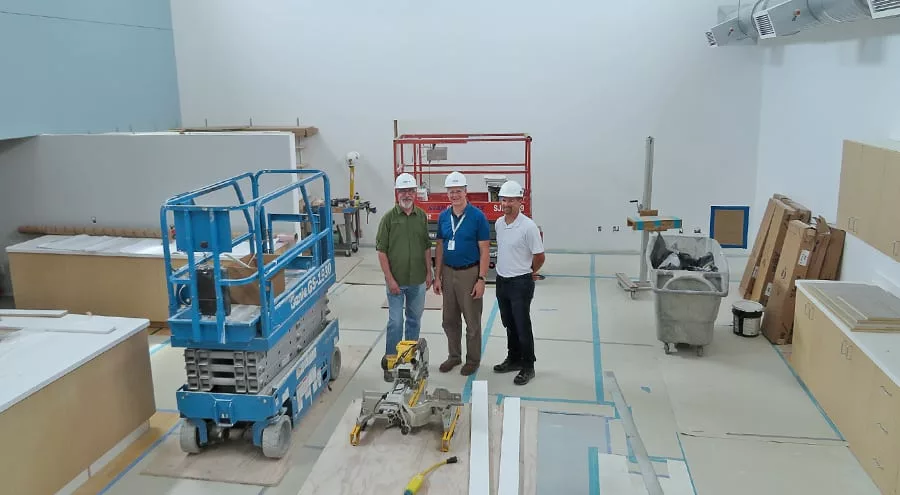
Home » Pathology provider consolidates operations into Richland lab
Pathology provider consolidates operations into Richland lab

July 16, 2018
Faster test results for patients and streamlined operations prompted a Spokane Valley pathology services provider to open a laboratory in Richland.
Incyte Diagnostics has been working on a $1.6 million renovation of a vacant office building at 221 Wellsian Way for an Aug. 13 opening.
Incyte is leasing the building, with an option to buy, to create a centralized location to serve clinicians at Kadlec and in Pendleton, Yakima and Walla Walla.
“We can take advantage of all staffing at one location with better production, better cross training and more efficient use of equipment,” said Gary Gemar, chief operating officer of Incyte Diagnostics.
Incyte also recently inked a contract with Kadlec to provide its histology services. Histology is the study of the microscopic structure of tissues.
The 7,608-square-foot building is next door to the Academy of Children’s Theatre.
Four couriers will be based at the Richland site; six others will work in the outlying areas to ferry samples to the lab.
The Richland office will have 38.5 full-time equivalent staff, with 27 existing staffers from Yakima, Walla Walla, Pendleton and Kadlec.
The opening of the new lab also added eight new positions, including data entry, information technology and client services personnel, and a pathologist assistant.
“If staff couldn’t relocate, we tried to make it as attract as possible with retention bonuses and paying for moving expenses,” Gemar said.
Some staff will stay in their original locations to support operations in leased space within the hospitals because they’re needed to perform frozen sections during surgeries as well as rapid assessments.
Total staff working at Incyte number 289, which includes 42 pathologists.
The private company, founded in 1957, boasts pathologists with subspecialty training in dermatopathology, gastrointestinal pathology, gynecologic pathology, hematopathology, neuropathology and oral and maxillofacial, renal, and urologic pathology.
Since the Tri-Cities is centrally located between Incyte’s labs in Yakima, Walla Walla and Pendleton, Gemar said it made sense to consolidate operations in Richland, especially after negotiating a deal to handle Kadlec’s histology operations.
Incyte already had been serving Kadlec since 2003 with professional interpretation of specimens.
In addition to its lab work, Incyte contracts with hospitals to provide laboratory medical directorship and consultation services.
Incyte hopes to develop a relationship with RCCH HealthCare since plans have been announced that the Tennessee-based company wants to take over Trios Health in Kennewick and Lourdes Health Care in Pasco, Gemar said.
“We would love them to be a part of this but time will tell. It makes sense to have one processing center in the community,” he said.
Lourdes already contracts with Incyte for professional services, Gemar said.
Other savings Incyte realized through consolidation include fewer annual proficiency and state inspections, a requirement at each individual lab. The distribution of the workload also will be improved, Gemar said.
The pathology team can review the day’s volume and distribute the workload equally. “That’s a huge thing because it’s really variable. It’s a huge benefit,” he said. “Our smaller locations like in Walla Walla and St. Anthony’s (in Pendleton), there’s not enough volume of tissue to have a pathologist assistant to (prepare the specimens) so pathologists have to do it. Now they don’t have to do that duty. They can focus on interpretation, tumor boards and medical director responsibilities,” Gemar said.
All this means faster test results for doctors and patients.
“We’re improving turnaround time on results. Less has to be sent to Spokane, more can stay here and the transportation is a really big deal. It slows things down,” Gemar said.
The process for reviewing the tissue samples is labor and time intensive, requiring a multi-step process once specimens arrive at the lab.
“Processing tissue is not a fast thing,” Gemar said.
Specimen information is input into a computer, then it’s dissected or bisected and put into cassettes for preservation and processing, which involves removing the fluids with a variety of chemicals that can take up to 10 hours, depending on tissue size. Breast or colonoscopy samples can take up 10 hours; skin moles can take six hours.
Then, the sample moves to an embedding process in which the tissue goes into a stainless-steel mold filled with hot liquid paraffin wax to create a block.
The next step involves cutting fine tissue slices and affixing them to the slides. The slides are stained and cover slipped before heading to the pathologist for diagnostic work.
“They make the diagnosis: normal or abnormal. If they can’t decide, there’s another test. Special stains are ordered which have antibodies,” Gemar said, explaining Incyte has special stains and 140 immunohistochemical antibodies to help zero in on a diagnosis.
Renovation on the 12-year-old Richland clinic, which used to be home to pain management and gastroenterology clinics and had been vacant for about two years, began in April.
The general contractor is Bouten Construction of Richland. NAC Architecture of Spokane is the architect.
One of the building’s unique features was a 2,112-square-foot badminton court with hardwood floors.
“The owners were from China and they have a real passion for badminton,” Gemar said, explaining the building also had a sports-themed bathroom and a room to restring rackets.
The racquet court has been split and turned into a histology lab and a tissue supply room.
Incyte opted to leave the court’s hardwood floor in the lab. Gemar also kept a couple of the birdies — hundreds were left on the court — on his Spokane Valley desk as a keepsake.
An open house for the new lab is planned for the fall.
Local News
KEYWORDS july 2018





